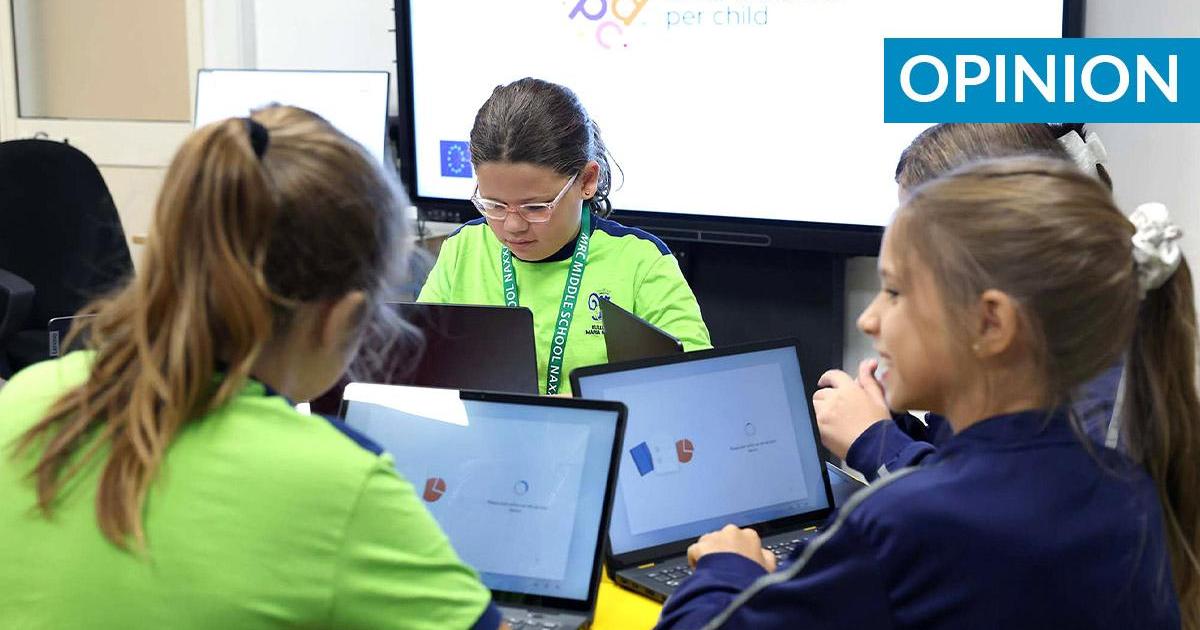
Investing in the future
Education lies at the heart of our nation’s development. It is the government’s duty not only to provide schools and teachers but also to ensure that every child is equipped to succeed in a rapidly changing world.
With this conviction, we have launched the One Device per Child project – a €54 million initiative, co-financed by Malta and European funds – to provide every secondary school student with a personal laptop.
This project represents a major step forward in bridging the digital divide and preparing our younger generations for the opportunities and challenges of tomorrow. In today’s classrooms, learning is no longer confined to textbooks and blackboards.
Technology has become central to how knowledge is shared, absorbed and applied. By giving every student their own device, we are ensuring that access to digital tools is no longer determined by family income or circumstance.
The first phase, starting in the 2025/26 scholastic year, will see students in Years 7, 8 and 9 in State, Church and independent schools receiving laptops. These devices come hand in hand with high-quality digital resources and training for educators. Teachers, parents and students will be supported in adapting to this new environment, with continuous professional development offered to ensure digital tools are used effectively. This is an investment not only in technology but in people.
At the heart of the project is also a strong focus on educators in that it also seeks to enhance their digital skills and competences. This will be achieved by supporting the continuous professional development of educators, equipping them with improved pedagogical methods and the capacity to effectively apply digital tools in classroom practice.
Another objective of the project is to integrate digital technologies into the national curriculum covering Years 7 to 11. This integration will involve the provision of digital educational content for various curricular subjects such as English, mathematics, science, Maltese, Maltese as a foreign language, foreign languages, history, geography, social studies, PSCD, religion, ethics and ICT.
The project will also cover the provision of a cloud-based Classroom Management Solution for all students’ devices from Year 4 until Year 11, their educators and school administrative personnel. This will provide secure identity and access management, child protection and security features, monitoring and control tools for device supervision and curriculum-aligned learning and content management. With a user-friendly interface, it ensures accessibility and ease of use while meeting high standards of security, compliance and pedagogical effectiveness.
Complementing all the above, the project will also include the provision of endpoint protection and a cloud-based Domain Name System web, aimed to ensure a holistic and robust security framework against the growing threat of cyber vulnerabilities.
This government believes that the future of Malta will be shaped in today’s classrooms
The benefits extend beyond the classroom. By strengthening digital literacy, we are building resilience in the Maltese economy and society. Europe has underlined the importance of investing in resilience, sustainability and digitalisation. With European support, Malta is aligning its policies with these priorities, ensuring that our workforce of tomorrow is better prepared for a world driven by knowledge, innovation and rapid technological change.
At the same time, this initiative reflects the wider role of European funds in improving the lives of citizens. Schools, infrastructure and training programmes have already benefitted from such funding. Now, through this partnership between Malta and the European Union, we are making a tangible difference in the daily lives of thousands of families.
We must also recognise the broader transformation at stake. Artificial intelligence, digitalisation and sustainable economic models are reshaping our future. These changes may be daunting but they are also opportunities. Our responsibility is to equip the next generation with the skills to thrive in this environment, to ensure that technology empowers rather than divides and to prepare our children to become active, capable citizens of tomorrow.
This is reflected in the Digital Education Strategy 2025-2030. The surge in digital innovation has permeated every aspect of our lives, reshaping the way we learn, work, and interact. In this context, the cultivation of digital literacy emerges as not merely a desirable skill but an imperative for personal growth, societal progress and democratic engagement.
This Digital Education Strategy 2025-2030 is not just a document; it is a commitment guiding us towards a future where digital competences are not just encouraged but embedded in the very fabric of our educational system. We recognise that the foundation for a digitally inclusive and participatory society begins in the classrooms of today. It is our collective responsibility to ensure that every individual, regardless of background or socio-economic status, has equal access to high-quality digital education.
The One Device per Child initiative is, therefore, more than a distribution of laptops. It is a commitment to inclusivity, equality of opportunity and investment in human potential. It is about giving every young person in Malta and Gozo the chance to dream, to learn and to achieve.
This government believes that the future of Malta will be shaped in today’s classrooms. By placing European funds at the service of education and by putting technology directly into the hands of our students, we are ensuring that the future is brighter, more resilient and full of opportunity.
Stefan Zrinzo Azzopardi is Minister for European Funds and Implementation of the Electoral Programme. Clifton Grima is Minister for Education, Sport, Youth, Research and Innovation.

